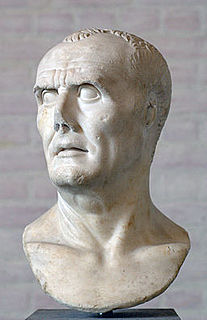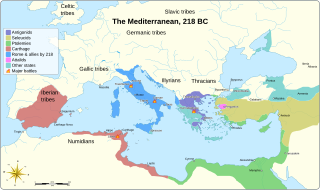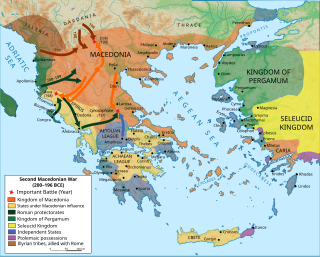Related Research Articles
This article concerns the period 219 BC – 210 BC.
Year 184 BC was a year of the pre-Julian Roman calendar. At the time it was known as the Year of the Consulship of Pulcher and Licinus. The denomination 184 BC for this year has been used since the early medieval period, when the Anno Domini calendar era became the prevalent method in Europe for naming years.
Year 212 BC was a year of the pre-Julian Roman calendar. At the time it was known as the Year of the Consulship of Flaccus and Pulcher. The denomination 212 BC for this year has been used since the early medieval period, when the Anno Domini calendar era became the prevalent method in Europe for naming years.

The decemviri or decemvirs were any of several 10-man commissions established by the Roman Republic.

Lucius Cornelius Scipio Asiaticus was a general and statesman of the Roman Republic. He was the son of Publius Cornelius Scipio and the younger brother of Scipio Africanus. He was elected consul in 190 BC, and later that year led the Roman forces to victory at the Battle of Magnesia.

The gens Claudia, sometimes written Clodia, was one of the most prominent patrician houses at ancient Rome. The gens traced its origin to the earliest days of the Roman Republic. The first of the Claudii to obtain the consulship was Appius Claudius Sabinus Regillensis, in 495 BC, and from that time its members frequently held the highest offices of the state, both under the Republic and in imperial times.

The First Macedonian War was fought by Rome, allied with the Aetolian League and Attalus I of Pergamon, against Philip V of Macedon, contemporaneously with the Second Punic War against Carthage. There were no decisive engagements, and the war ended in a stalemate.

The Second Macedonian War was fought between Macedon, led by Philip V of Macedon, and Rome, allied with Pergamon and Rhodes. Philip was defeated and was forced to abandon all possessions in southern Greece, Thrace and Asia Minor. During their intervention, although the Romans declared the "freedom of the Greeks" against the rule from the Macedonian kingdom, the war marked a significant stage in increasing Roman intervention in the affairs of the eastern Mediterranean, which would eventually lead to Rome's conquest of the entire region.
The Third Macedonian War was a war fought between the Roman Republic and King Perseus of Macedon. In 179 BC, King Philip V of Macedon died and was succeeded by his ambitious son Perseus. He was anti-Roman and stirred anti-Roman feelings around Macedonia. Tensions escalated and Rome declared war on Macedon.
Publius Sulpicius Galba Maximus was a Roman military officer and Senator who was elected Roman consul twice, and appointed dictator once. He fought in the Second Punic War and the First and Second Macedonian Wars.
Appius Claudius Pulcher was a Roman general and politician of the 3rd century BC, active in the Second Punic War.
Appius Claudius Pulcher was a Roman noble, general and politician of the 1st century BC. He was the father of a number of renowned Romans, most notable: the infamous Clodius and Clodia.
Appius Claudius Pulcher was a Roman patrician, politician and general in the first century BC. He was consul of the Roman Republic in 54 BC. He was an expert in Roman law and antiquities, especially the esoteric lore of the augural college of which he was a controversial member. He was head of the senior line of the most powerful family of the patrician Claudii. The Claudii were one of the five leading families which had dominated Roman social and political life from the earliest years of the republic. He is best known as the recipient of 13 of the extant letters in Cicero's ad Familiares corpus, which date from winter 53-52 to summer 50 BC. Regrettably they do not include any of Appius' replies to Cicero as extant texts of any sort by members of Rome's ruling aristocracy are quite rare, apart from those of Julius Caesar. He is also well known for being the older brother of the infamous Clodius and Clodia.
Marcus Perperna, Roman consul in 130 BC, is said to have been a consul before he was a citizen; for Valerius Maximus relates, that the father of this Perperna was condemned under the lex Papia after the death of his son, because he had falsely usurped the rights of a Roman citizen but his father was later deemed innocent of all charges and his citizenship was reinstated because he was one of the few clever enough to keep his family records because they took advantage of a law of colonists reclaiming Roman citizenship if they can prove it.

Gaius Claudius Nero was a Roman general active during the Second Punic War against the invading Carthaginian force, led by Hannibal Barca. He should not be confused with the Roman Emperor Nero. During a military career that began as legate in 214 BC, he was propraetor in 211 BC during the siege of Capua, before being sent to Spain that same year. He became consul in 207 BC.
Gaius Claudius Pulcher, consul in 177 BC, was the son of Appius Claudius Pulcher, consul in 212 BC, and he was the father of Appius Claudius Pulcher, consul in 143 BC.
Publius Claudius Pulcher was son of Appius Claudius Pulcher and brother of Appius Claudius Pulcher. In 189 BC he was curule aedile, and in 188 BC praetor. He was elected to the consulship through the devices of his brother in 184 BC, and in 181 BC he was one of the three commissioners appointed for planting a colony at Graviscae, a city on the coast of Etruria between Cosa and Castrum Novum.
Publius Sempronius C.f. Tuditanus was a Roman Republican consul and censor, best known for leading about 600 men to safety at Cannae in August, 216 BC and for the Treaty of Phoenice which ended the First Macedonian War, in 205 BC.
Appius Claudius Pulcher was a Roman politician. An early supporter of Augustus, he was elected consul in 38 BC.
The gens Trebonia, rarely Terebonia, was a plebeian family at ancient Rome. Members of this gens are mentioned in the first century of the Republic, and regularly throughout Roman history, but none of them attained the consulship until the time of Caesar.
References
This entry incorporates public domain text originally from:
- William Smith (ed.), Dictionary of Greek and Roman Biography and Mythology, 1870.